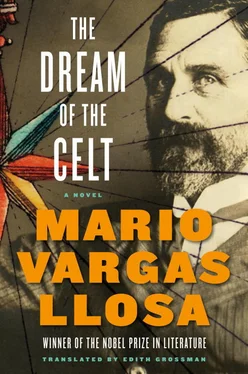For the rest of his life, Roger lamented—he said it again now, in 1902, in his fever—dedicating his first eight years in Africa to working, like a pawn in a game of chess, on the building of the Congo Free State, investing his time, health, effort, and idealism, and believing that in this way he was contributing to a philanthropic plan.
At times, searching for justifications, he asked himself: How could I have realized what was going on in those million square miles, working as an overseer or crew leader in Stanley’s expedition of 1884 and in the North American Henry Shelton Sanford’s expedition, between 1886 and 1888, in stations and factories recently established along the caravan route? He was only a tiny piece of the gigantic apparatus that had begun to take form, and no one except its astute creator and a close group of collaborators knew of what it would consist.
Still, on the two occasions he had spoken with the king of the Belgians in 1900, when he had recently been named consul in Boma by the Foreign Office, Roger felt a deep mistrust of that large, robust man covered in decorations, with his long combed beard, formidable nose, and a prophet’s eyes who, knowing that the diplomat was in Brussels on his way to the Congo, invited him to supper. The magnificence of the palace with its deep, soft carpets, crystal chandeliers, engraved mirrors, and Asian statuettes made him dizzy. There were a dozen guests in addition to Queen Marie Henriette, the King’s daughter Princess Clémentine, and Prince Victor Napoléon of France. The monarch monopolized the conversation the entire night. He spoke like an inspired preacher, and when he described the cruelties of the Arab slave traders who left Zanzibar to make their “runs,” his strong voice attained mystic intonations. Christian Europe had an obligation to put a stop to that traffic in human flesh. He had proposed this and it would be the offering of little Belgium to civilization: liberating a suffering humanity from such horror. The elegant ladies yawned, Prince Napoléon murmured gallantries to the lady next to him, and no one listened to the orchestra playing a Haydn symphony.
The following morning Leopold II summoned the British consul for a private conversation. He received him in his private reception room. There were many porcelain objects and figurines of jade and ivory. The monarch smelled of cologne and had shiny nails. As on the previous evening, Roger could scarcely get in a word. The king of the Belgians spoke of his quixotic quest and how misunderstood it was by journalists and resentful politicians. Errors were committed and there were excesses, no doubt. The reason? It was not easy to contract honorable, capable people willing to risk working in the distant Congo. He asked the consul to inform him personally if, in his new post, he observed anything that needed correction. Roger had the impression that the king of the Belgians was pompous and self-involved.
Now, two years later, in 1902, he told himself the king undoubtedly was both those things, but also a statesman of cold, Machiavellian intelligence. As soon as the Congo Free State had been established, Leopold II, by means of a decree in 1886, reserved as Domaine de la Couronne some 100,000 square miles between the Kasai and Ruki Rivers, which his explorers—principally Stanley—had indicated were rich in rubber trees. This expanse lay outside all the concessions to private enterprises and was intended for exploitation by the sovereign. The International Congo Society was replaced as a legal entity by l’État Indépendant du Congo, the Congo Free State, whose only president and trustee was Leopold II.
Explaining to international public opinion that the only effective way to suppress the slave trade was with a “security force,” the king sent two thousand soldiers from the regular Belgian army to the Congo, to be supplemented by a militia of ten thousand natives, whose maintenance would be assumed by the Congolese population. Even though most of this army was under the command of Belgian officers, its ranks, and above all the leadership positions in the militia, were permeated by individuals of the worst kind, scoundrels, ex-convicts, adventurers hungry for a fortune, who had come from the low districts of vice dens and brothels in Europe. The Force Publique became embedded, like a parasite in a living organism, in the tangle of villages scattered over a region the size of Europe, measured from Spain to the borders of Russia, that would be maintained by an African community who did not understand what was happening to them, except that the invasion that overtook them was a plague more devastating than slave hunters, locusts, red ants, and incantations that brought the sleep of death. Because the soldiers and militiamen of the Force Publique were greedy, brutal, and insatiable when it came to food, drink, women, animals, skins, ivory—in short, everything that could be stolen, eaten, drunk, sold, or violated.
At the same time the exploitation of the Congolese began in this way, the humanitarian monarch, following another of the mandates he had received, started to grant concessions to businesses in order to “open by means of commerce the road to civilization for the natives of Africa.” Some traders died, overcome by malaria, bitten by snakes, or devoured by wild beasts due to their ignorance of the jungles, and another few fell to the poisoned arrows and spears of natives who dared rebel against these outsiders who had weapons that exploded like thunder or burned like lightning; the colonists explained to them that according to contracts signed by their chiefs, they had to abandon their planting, fishing, hunting, rituals, and routines to become guides, porters, hunters, or harvesters of rubber without any salary at all. A good number of concessionaires, friends and favorites of the Belgian monarch, himself above all, made great fortunes in a very short time.
By means of the system of concessions, companies spread through the Congo Free State in concentric waves, penetrating deeper and deeper into the immense region bathed by the Middle and Upper Congo and its spider’s web of tributaries. In their respective domains, they enjoyed sovereignty. In addition to being protected by the Force Publique, they counted on their own militias, always headed by some ex-soldier, ex-jailer, ex-convict, or fugitive, some of whom would become famous throughout all of Africa for their savagery. In a few years the Congo became the world’s leading producer of the rubber the civilized world demanded in larger and larger quantities for carriages, automobiles, and trains, in addition to other kinds of transport, apparel, decoration, and irrigation.
Roger Casement was not fully conscious of any of this in the eight years—1884 to 1892—when, working very hard, suffering from malaria, turning dark in the African sun, becoming covered with scars from the bites, scratches, and gashes of plants and insects, he labored tenaciously to support the commercial and political creation of Leopold II. What he did know about was the appearance and domination in those infinite domains of the symbol of colonization: the chicote whip.
Who invented that delicate, manageable, and efficacious instrument for rousing, frightening, and punishing indolence, clumsiness, or stupidity in those ebony-colored bipeds who never managed to do things in the way the colonists expected, whether it was working in camp, handing over the manioc ( kwango ), antelope or wild boar meat, and other foodstuffs assigned to each village or family, or the taxes to pay for the public works the government was building? It was said the inventor had been a captain in the Force Publique named M. Chicot, a Belgian in the first wave, a man apparently both practical and imaginative and endowed with sharp powers of observation, for he noticed before anyone else that the extremely tough hide of the hippopotamus could be fashioned into a whip more durable and damaging than those made of equine and feline intestines, a vine-like cord able to produce more burning, blood, scars, and pain than any other scourge, and at the same time light and functional, for curled into a small wooden haft, overseers, orderlies, guards, jailers, and foremen could wrap it around their waist or hang it over their shoulder almost without realizing they were carrying it because it weighed so little. Its mere presence among the members of the Force Publique had an intimidating effect: the eyes of black men, women, and children grew large when they saw it, the whites of their eyes gleamed with terror in their deep-black or blue-black faces, imagining that after any mistake, slip, or failing, the chicote would rip through the air with its unmistakable whistle and fall on their legs, buttocks, and backs, making them shriek.
Читать дальше












